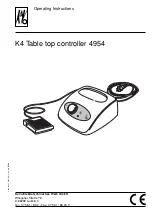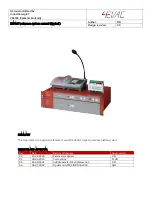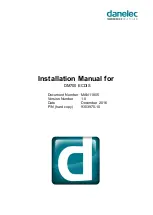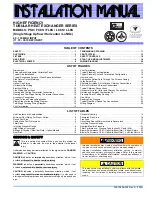
Pre
face
Preface
LIFEPAK 20e Defibrillator/Monitor Operating Instructions
ix
©2006-2015 Physio-Control, Inc.
ABOUT DEFIBRILLATION THERAPY
Operator Considerations
A direct current defibrillator applies a brief, intense pulse of electricity to the heart muscle. The
LIFEPAK 20e defibrillator/monitor delivers this energy through disposable electrodes, standard
paddles or internal paddles applied to the patient’s chest.
Defibrillation is only one aspect of the medical care required to resuscitate a patient with a
shockable ECG rhythm. Depending on the situation, other supportive measures may include:
• Cardiopulmonary resuscitation (CPR)
• Administration of supplemental oxygen
• Drug therapy
Successful resuscitation is related to the length of time between the onset of a heart rhythm that
does not circulate blood (ventricular fibrillation, pulseless ventricular tachycardia) and
defibrillation. The American Heart Association has identified the following as critical links in the
chain of survival from cardiac arrest:
• Early access
• Early CPR by first responders or bystanders
• Early defibrillation
• Early advanced life support
The physiological state of the patient may affect the likelihood of successful defibrillation. Thus,
failure to resuscitate a patient is not a reliable indicator of defibrillator performance. Patients will
often exhibit a muscular response (such as jumping or twitching) during an energy transfer. The
absence of such a response is not a reliable indicator of actual energy delivery or device
performance.
Indications
Defibrillation is a recognized means of terminating certain potentially fatal arrhythmias, such as
ventricular fibrillation and symptomatic ventricular tachycardia. Delivery of this energy in the
synchronized mode is a method for treating atrial fibrillation, atrial flutter, paroxysmal
supraventricular tachycardia and, in relatively stable patients, ventricular tachycardia.
Contraindications
Defibrillation is contraindicated in the treatment of Pulseless Electrical Activity (PEA) such as
idioventricular or ventricular escape rhythms, and in the treatment of asystole.
Summary of Contents for LIFEPAK 20
Page 2: ...LIFEPAK 20e DEFIBRILLATOR MONITOR Operating Instructions ...
Page 3: ......
Page 4: ...LIFEPAK 20e DEFIBRILLATOR MONITOR OPERATING INSTRUCTIONS ...
Page 15: ......
Page 49: ......
Page 111: ......
Page 155: ......
Page 171: ......
Page 181: ......
Page 183: ......
Page 189: ......
Page 191: ......
Page 195: ......
Page 199: ......
Page 201: ......
Page 205: ......
Page 209: ......
Page 211: ......
Page 213: ......
Page 215: ......
Page 221: ......
Page 226: ......













































